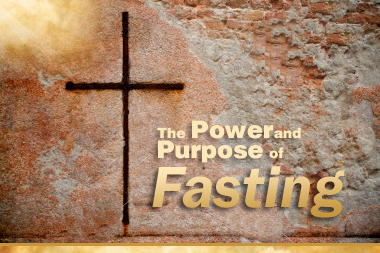Mark 2:18-20
18 John’s disciples and the Pharisees were fasting; and they came and said to Him, “Why do John’s disciples and the disciples of the Pharisees fast, but Your disciples do not fast?” 19 And Jesus said to them, “While the bridegroom is with them, the attendants of the bridegroom cannot fast, can they? So long as they have the bridegroom with them, they cannot fast. 20 “But the days will come when the bridegroom is taken away from them, and then they will fast in that day.
This short dialogue gives us a little insight into the tradition of fasting while simultaneously revealing Jesus’ perception of fasting. Jesus, filled and empowered by the Holy Spirit, brought to His disciples the presence of God. The Pharisees had a ritual of fasting twice a week in order to display their piety and build up their own self-righteousness. John’s disciples were fasting in response to his recent death, a fast of mourning, which was very customary among Jews. Yet Jesus says, “why would my disciples fast? What reason do they have to fast?”
I learned not too long ago that fasting is designed to be in response to something in our lives. Jesus’ fast was in response to His receiving of the Holy Spirit, whom prompted Him to fast and wander into the wilderness for 40 days. Since the Pharisees fasted out of ritual and not purpose and John’s disciples had a reason to be fasting, Jesus’ response made sense to John’s disciples and simultaneously exposed the religiosity of the Pharisees. Fasting is designed to give us a period of intimate connection with God. Since Jesus’ disciples were connected as such through His immediate presence, they had no purpose to fast while He was still with them. It was a time of celebration and joy that He was with them at that time.
The word “attendants” denoted in the original Greek as huios indicates family or followers. Jesus’ intention here in using this imagery is to demonstrate that His disciples were very close to Him and thus to God. As humans, we struggle with the idea of this closeness to God and Jesus was pointing out that because they were with Him, they were very close to God. It also indicates, however, that there would be a time in the future when He would go away. It is upon Jesus’ departure that His disciples (followers) would fast in response to Him not being with them physically. Fasting helps us to ascend past our physicality as humans and focus more on our spiritual connection with God. Much like in our human relationships that need periods of focused one-on-one time together, we need the same intimacy with God in order to strengthen that relationship.
There are many kinds of ways to fast and a handful of reasons why people fast, but all of it comes back to enhancing your connection with God. Even those who fast not necessarily for spiritual reasons will find an almost supernatural benefit to it. When we fast, it is like we are breaking one of the ropes that is keeping our body tied to this world and we rise up just a little higher like a hot air balloon ready to be released into the sky. This is why we get an enhanced spiritual experience when we fast. We must be careful, however, for the motivation behind our fasting. To close today, let us review what Jesus said about when we do fast in Matthew 6:
[quote]16 “Whenever you fast, do not put on a gloomy face as the hypocrites do, for they neglect their appearance so that they will be noticed by men when they are fasting. Truly I say to you, they have their reward in full. 17 “But you, when you fast, anoint your head and wash your face 18 so that your fasting will not be noticed by men, but by your Father who is in secret; and your Father who sees what is done in secret will reward you.[/quote]


